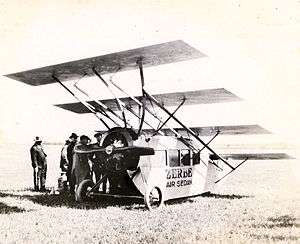Zerbe Air Sedan
| Zerbe Air Sedan | |
|---|---|
 | |
| Zerbe Air Sedan at the Fayetteville, Arkansas fair grounds in 1919 | |
| Role | Passenger |
| National origin | United States |
| Designer | Professor James Slough Zerbe |
| First flight | 1919 |
| Status | Abandoned project |
| Number built | 1 |
|
| |
The Zerbe Air Sedan was an American single engine quadruplane passenger aircraft project started by Professor James Slough Zerbe in 1918. The machine made one flight in 1919, was damaged during landing and subsequently abandoned.[1]
Design and development
In 1918 Zerbe arrived in Fayetteville to begin work on passenger aircraft for local businessmen. The aircraft, completed in 1919, was a positive staggered equal span quadruplane with double cambered[2] louvered main wings. Equipped with no tailplane or ailerons, the machine was controlled using "ganged" or linkage connected wings with variable-incidence.[2]
The passenger cabin was made of plywood and fully enclosed with wide stance landing gear attached.[2] A French World War I surplus powerplant was used, and has been reported to be a 90 hp (67 kW) LeRhône or 100 hp (75 kW) Gnôme[2] rotary engine, but evidence suggests it was in fact a Le Rhône 9J of 110 hp (82 kW).
Operational history
The Air Sedan was piloted by Tom Flannery on its first and only flight in 1919 at the Washington County Fairgrounds in Fayetteville, Arkansas. The aircraft took off and quickly climbed to 100 ft (30 m), flew approximately 1000 ft (300 m) then was significantly damaged during landing.[3] One report states: " After that Zerbe left town never to be heard of or seen again. What happened to the abandoned damaged plane is unknown".[3]
References
- ↑ Nathania Sawyer (16 April 2012). "Zerbe Air Sedan". encyclopediaofarkansas.net. The Central Arkansas Library System. Retrieved 12 September 2015.
- 1 2 3 4 "Zerbe". aerofiles.com. Aerofiles. 8 June 2008. Retrieved 12 September 2015.
- 1 2 "Zerbe Air Sedan". 1000aircraftphotos.com. 31 March 2012. Retrieved 12 September 2015.